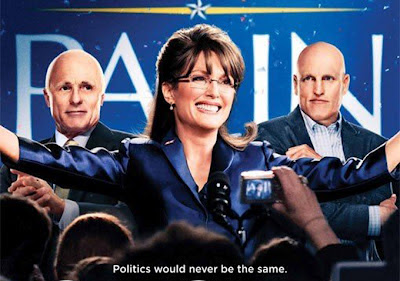Tuesday, 10 April 2012
The Devil And The Details
There’s been a lot of speculation in the right wing press about the veracity of HBO’s docudrama Game Change, ever since the adaptation of John Heilemann and Mark Halperin’s 2010 book was first announced.
Pre-emptively labelling it another ‘liberal Hollywood elite’ hack-job, critics sharpened their blades and prepared to get stuck into the film for playing fast and loose with the facts. To them, Sarah Palin is an unassailable figure, representing folksy home-spun wisdom and traditional Christian values, all wrapped up in a tidy MILFy package. And since The Hollywood Reporter helpfully pointed out that the film's top talent and executives had, between them, donated US$200, 000 to Democratic causes, it was unlikely to give their moose-murdering heroine a fair hearing.
In fact, the film is a surprisingly even-handed portrayal of one of the most compelling footnotes in recent political history. I say ‘footnote’ because the fact remains that this is the story of a campaign that failed. Sorry if that spoils the ending for you, but at this stage, it’s like warning people that the dénouement of Titanic is a little moist.
So why make Game Change at all? Surely a film about Obama’s genuinely historic election would make for a more uplifting and celebratory narrative? But that’s to miss the point of this fascinating and compelling film, which instead addresses the key question at the heart of McCain’s ill-fated attempt to win the White House. Namely, what were they thinking?
McCain has long been regarded as one of the most likeable and honourable Republican Senators, by observers at both ends of the political spectrum. So his decision to pair up with a photogenic ‘Soccer Mom’ seemed ill-advised at best, and downright terrifying at worst. Indeed, there are several genuinely chilling moments in Game Change, as McCain’s team of advisors question the wisdom of putting the big red button within the grasp of Palin’s neatly manicured French tips.
Here’s a woman who has to be given a crash course in geography (“This is Germany, we fought against them in two World Wars”) by advisors expecting to discuss more taxing geopolitical issues. At one point, the campaign’s chief strategist Steve Schmidt (played by Woody Harrelson) coaches Palin for the Vice Presidential debate and asks her about how she would manage the special relationship between the US and the UK, given that support for military action in the Middle East is at an all time low. She responds by saying "America has always had a great relationship with the Queen…" Cue a rather panicked explanation of the difference between Prime Minister and a Head of State.
Despite Palin’s considerable intellectual shortcomings, the film refuses to poke fun at her, instead commending her remarkable ability to connect with ordinary people. We may question the disingenuous way that Republicans have successfully demonised anyone with a tertiary education as the ‘intellectual elite’, but Palin remained resolutely committed to her role as the ‘you betcha!’ voice of everyman (and woman).
Having made peace with their ‘high risk, high reward strategy’, the Republican strategists can barely contain their glee as their progeny begins to charm the crowds. As Palin watches Barack securing the Democratic Party nomination, she comments, "I'm just watching Obama's big fancy speech. They sure do love him." Their reply: "They're gonna love you more." You can almost hear her eyes make that ker-ching sound.
Showcasing that unmistakable grin, as if invisible hands are continually checking her bridge-work, Julianne Moore nails Palin far more effectively than Tina Fey’s hilarious but one-dimensional portrayal ever could. We see her struggle with her own personal ideology when it conflicts with McCain’s more centrist approach, and we feel genuine empathy for her as her lack of preparedness threatens to derail the entire campaign. As her advisors worry that she’s in the throws of a full-blown nervous breakdown, Palin sits at the table like a petulant pre-teen refusing to eat her greens.
Much has been made of the film’s powerhouse cast – TV movies not usually being known for their ability to score actors of the calibre of Julianne Moore and Ed Harris. But credit should also go to director Jay Roach, who deftly applies his background in big-screen comedy (having helmed all the Austin Powers and Meet The Parents movies), in giving this potentially dry tale an effervescent energy. In fact, much of the film plays like a contemporary retelling of George Cukor’s classic Born Yesterday. Think My Fair Lady, but with more Creationism.
So back to that original question, what were they thinking? The answer lies in one of the early scenes in the film. Marvelling at the hero’s welcome Obama receives while visiting Germany on the campaign trail, Schmidt reveals the key insight that will help them reclaim the lead from the Democrat wunderkind – “We need to ask whether America wants a statesman, or a celebrity.” By choosing to align with the untested and hurriedly vetted Palin, they ended up offering America one of each.
Subscribe to:
Post Comments (Atom)


No comments:
Post a Comment